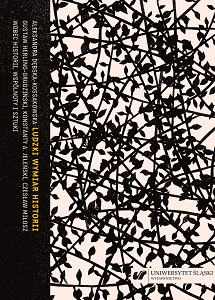Ludzki wymiar historii. Gustaw Herling-Grudziński, Konstanty A. Jeleński, Czesław Miłosz wobec historii, wspólnoty i sztuki
The Human Dimension of History. Gustaw Herling-Grudziński, Konstanty A. Jeleński, Czesław Miłosz towards History, Community, and Art
Author(s): Aleksandra Dębska-Kossakowska
Subject(s): Language and Literature Studies, Studies of Literature
Published by: Wydawnictwo Uniwersytetu Śląskiego
Keywords: history;totalitarianism; axiology;metaphysics;
Summary/Abstract: Despite their belonging to two separate literary generations, namely, those born around 1910 and 1920, Gustaw Herling-Grudziński, Konstanty A. Jeleński, and Czesław Miłosz represent the very same cultural formation. They were all Polish humanists moulded by the common paradigm of values founded upon the basis of shared reading list.In consecutive parts of her work, the author shows the ways in which Herling-Grudziński, Jeleński, and Miłosz, at subsequent stages of their lives, were entangled in history. Part One describes them as grappling with totalitarianism and the artist’s moral dilemmas, providing historical and political backdrop to the fates of future émigrés and indicating the ramifications of their choice to emigrate for their artistic work. The chapter entitled Wobec historii i polityki [Towards History and Politics] is a particularly close account of Herling-Grudziński’s discussion with the diagnosis contained in The Captive Mind over the course of nearly fifty years.Part Two of the book is devoted to the involvement of the said writers into Europe’s literary life. In the chapter Wobec wspólnoty [Towards Community] the author discusses their relationships with the Congress for Cultural Freedom. She gives the account of Jeleński’s output in both the field of literature and opinion journalism as the editor-in-chief of Parisbased monthly Preuves, as well as Herling-Grudziński’s contributions to a Rome-based magazine Tempo Presente.The book’s final part, entitled Wobec powinności artysty [Towards Artist’s Duty] is devoted to metaphysical and axiological problematics present in writings by Herling-Grudziński, Jeleński, and Miłosz. What was conspicuous in all they put their minds to – the literary art, the commentaries they worded, explanations they addressed to Western public opinion, and finally, in their endeavour to most adequately express their views on metaphysical foundations of art and existence – was their personal stigma and personal involvement. Thereby, the History, along with their histories, gained an individual human dimension.
Series: Studia literackie
- E-ISBN-13: 978-83-226-3984-9
- Print-ISBN-13: 978-83-226-3983-2
- Page Count: 342
- Publication Year: 2020
- Language: Polish
- eBook-PDF
- Table of Content
- Introduction

